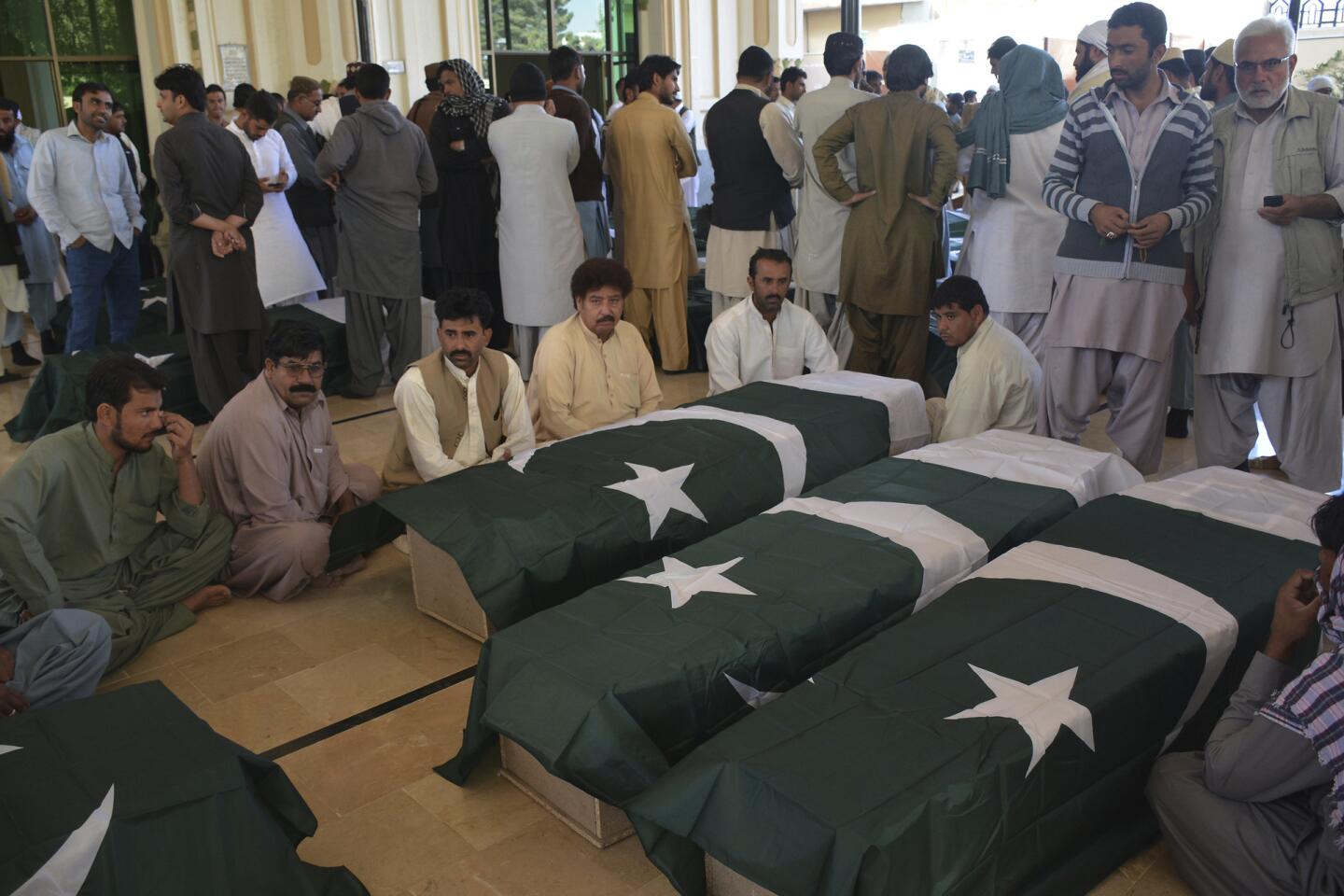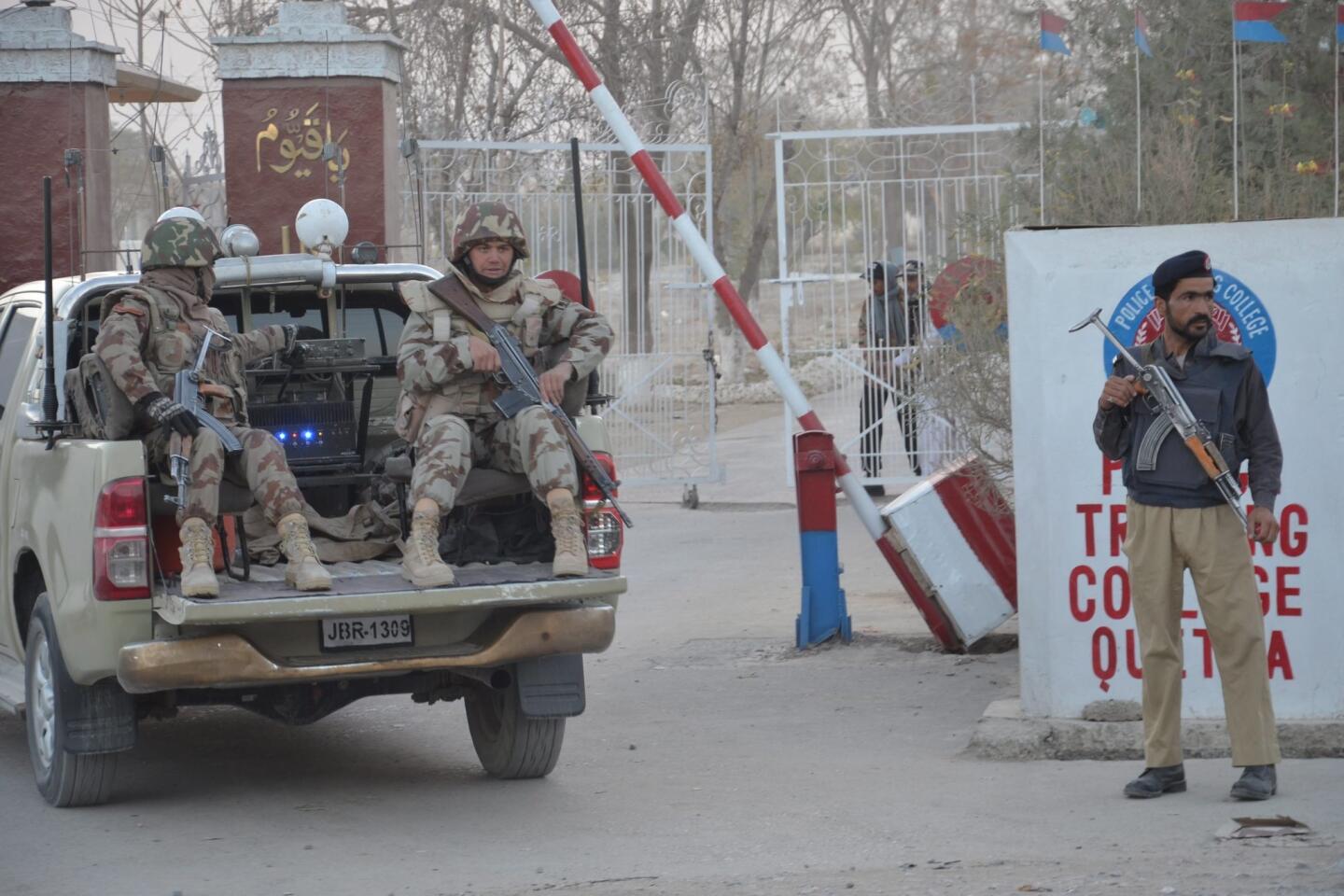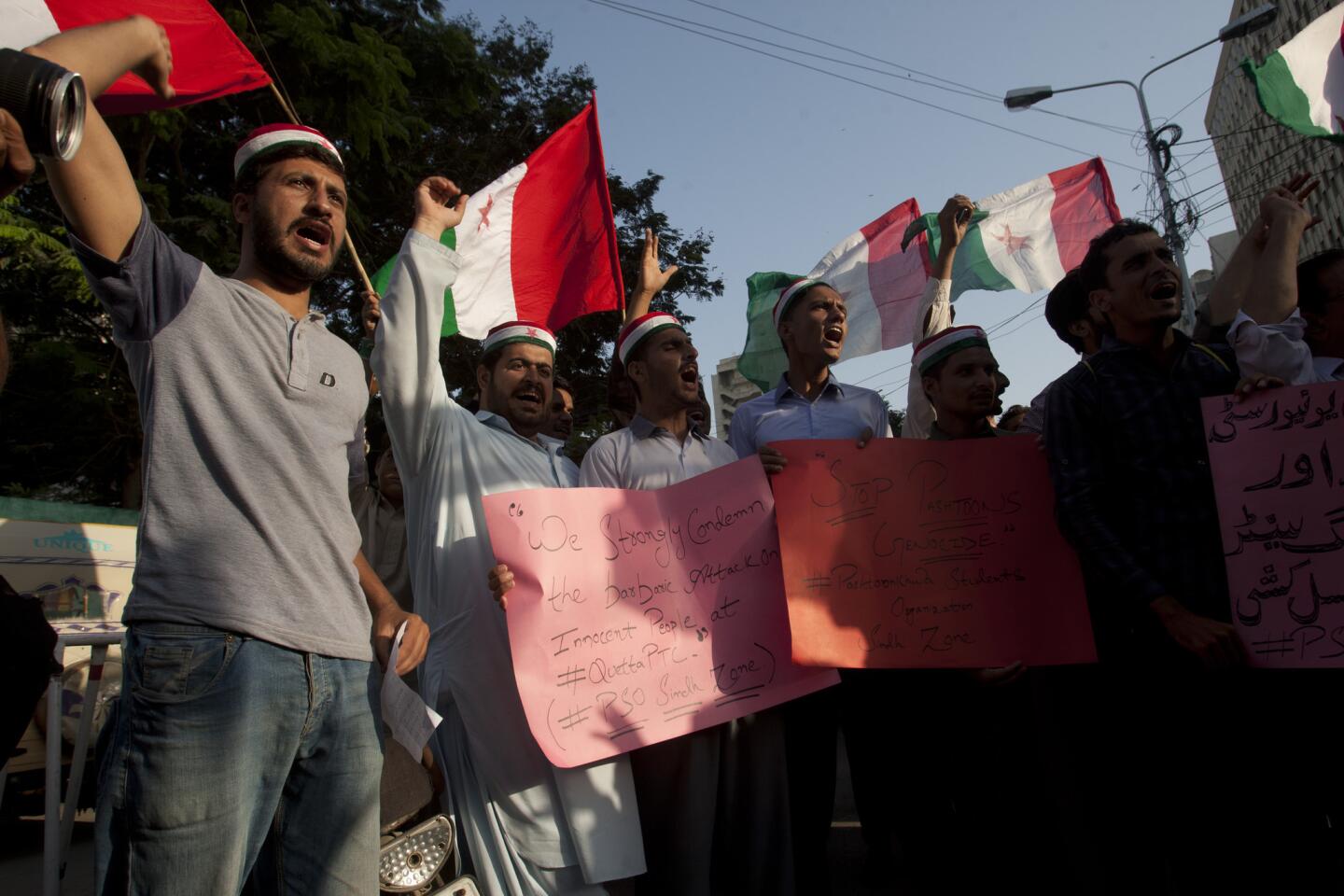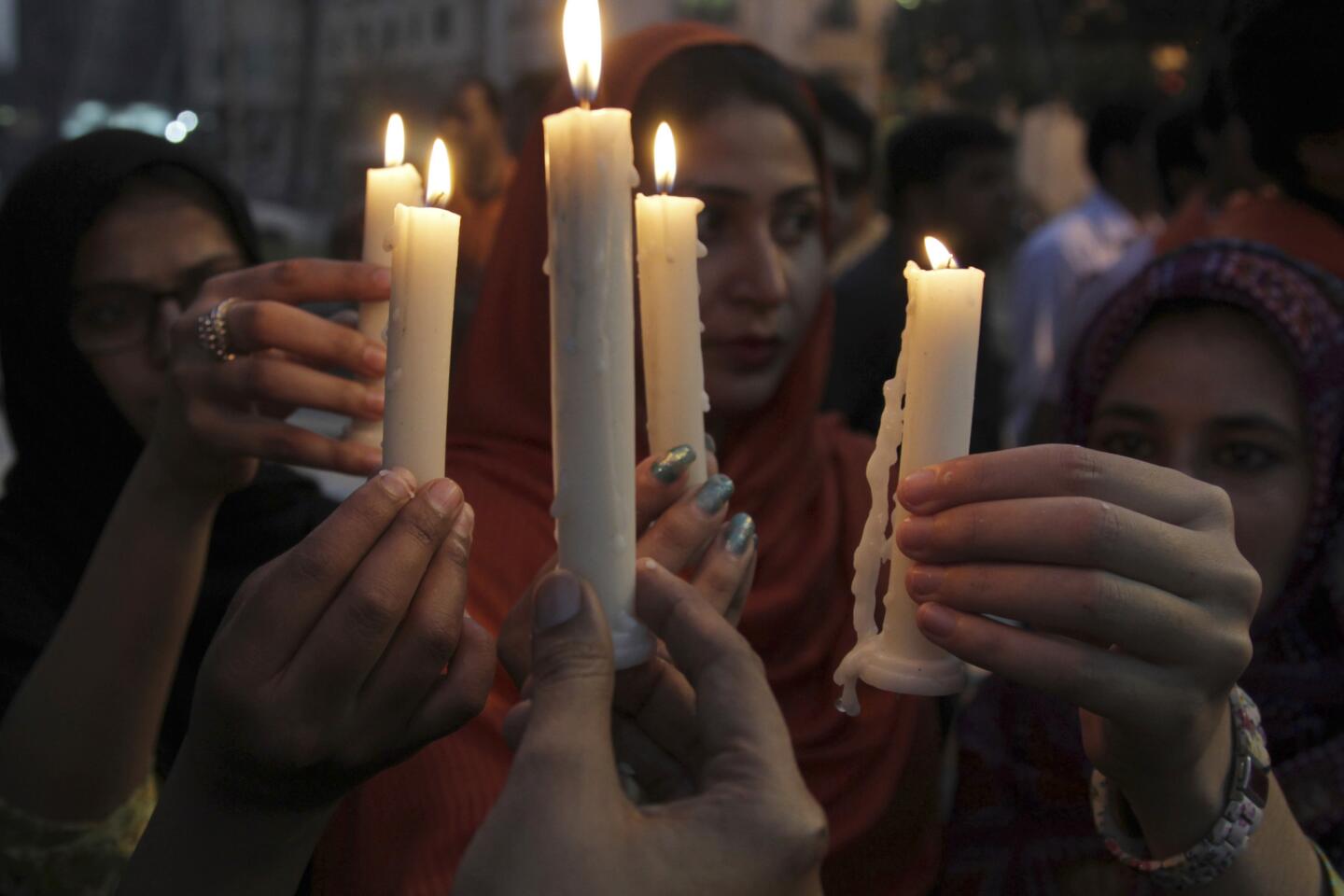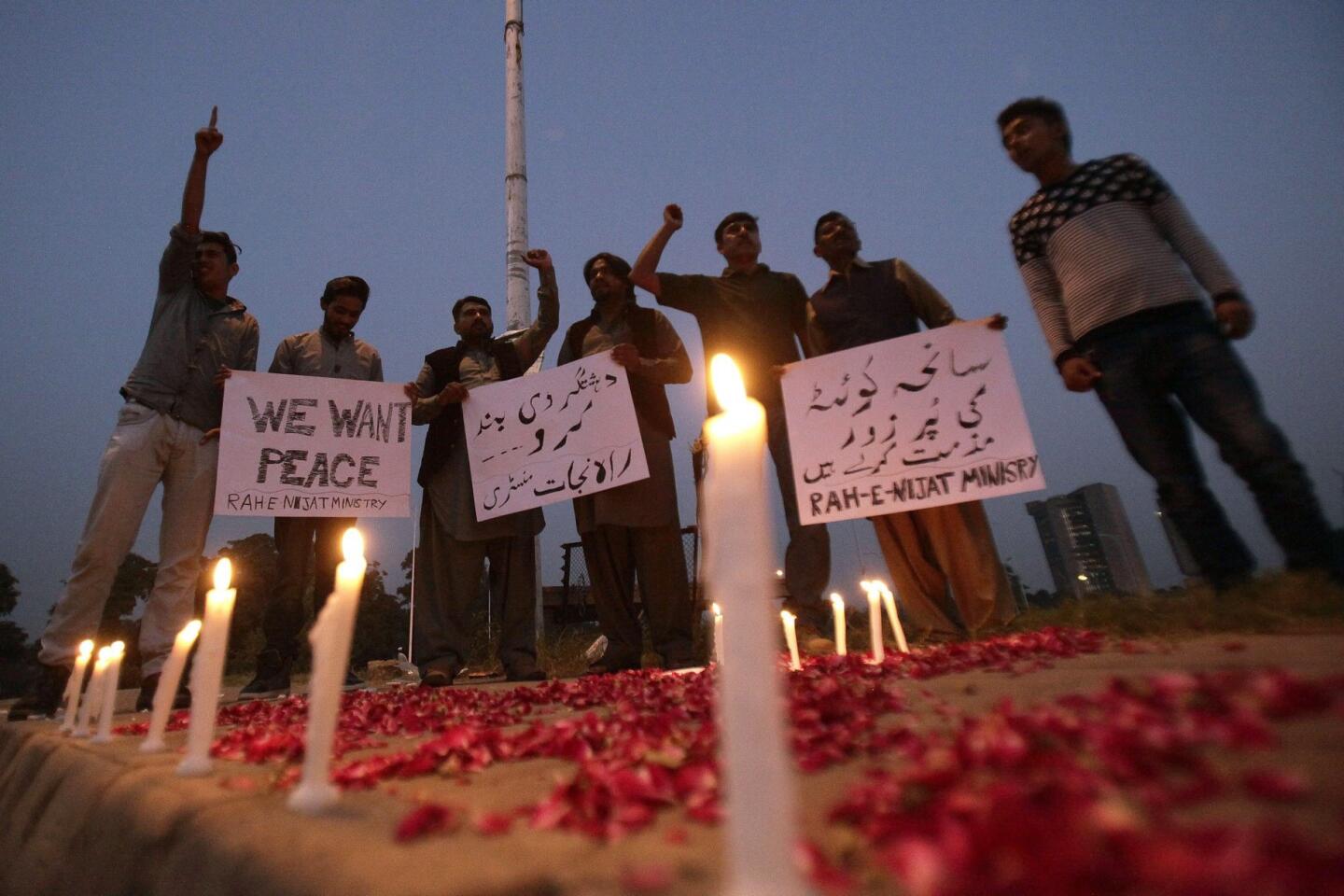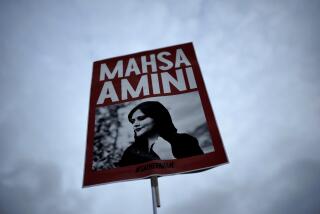Islamic State, under pressure in Iraq, claims attack that killed 60 police cadets in Pakistan
Islamic State claimed responsibility Tuesday for an attack on a police academy in southwestern Pakistan that killed at least 60 cadets, demonstrating the militant organization’s ability to create havoc far from its shrinking bases in Iraq and Syria.
The extremist group’s mouthpiece, the Amaq News Agency, said its South Asia wing — known as Islamic State in Khorasan — carried out a “three-man suicide raid” on the Baluchistan Police College. It was one of the deadliest terrorist attacks in Pakistan this year.
Pakistani military officials blamed the attack on militants from Lashkar-e-Jhangvi al-Alami, a Sunni Muslim extremist group that has links to Islamic State in Khorasan. A spokesman for the organization told The Times that it carried out the raid with help from Islamic State, although he did not elaborate.
“We are open to support any organization which would support us,” said the spokesman, who spoke on condition of anonymity because the extremist group is banned in Pakistan.
Police said three militants armed with automatic rifles and grenades attacked the police training center Monday night in Quetta, the capital of volatile Baluchistan province, taking aim at dormitories where hundreds of cadets ages 15 to 25 are housed. Two of the militants detonated suicide vests, while a third was shot dead by paramilitary forces, officials said.
The death toll by Tuesday morning had surpassed 60. Nearly all the dead were cadets, according to a rescue official who requested anonymity because he was not authorized to speak to the media.
More than 120 people were injured, including cadets who fled the explosions by scaling the compound’s 10-foot perimeter wall.
One hospitalized survivor told reporters in Quetta that he was in his barracks when an attacker stormed inside and began firing indiscriminately.
“Everybody was running in the barracks to save his life,” the cadet said. “I climbed the stairs to reach the rooftop and then jumped from the roof to save my life. I was injured, but I survived — unlike many of the others.”
Analysts said the support — if not direct operational involvement — of Islamic State in the raid was likely. While Iraqi forces mount a drive to rout Islamic State from its base in the city of Mosul, the militant group’s allies have demonstrated their ability to carry out attacks in Afghanistan and Pakistan.
Maj. Gen. Sher Afgan, chief of the paramilitary Frontier Corps in Baluchistan, said Pakistani authorities had “intercepted communications” that showed Lashkar-e-Jhangvi al-Alami assailants — who have attacked security installations and religious minorities, particularly Shiites — were in contact with “their handlers in Afghanistan.”
Islamic State in Khorasan is active in neighboring Afghanistan and shares the Pakistani group’s anti-Shiite ideology. Abu Muhammad Adnani, a senior leader of Islamic State who reportedly was killed in a U.S. drone strike in Syria in August, had called on his followers to kill Shiites because they were not true Muslims.
Even if half of Islamic State’s fighters from South Asia, or one-fourth of them, return to this region, things will get very hot.
— Abdul Basit, a fellow at the International Center for Political Violence and Terrorism Research in Singapore
Over the past two weeks, Lashkar-e-Jhangvi al-Alami claimed to have assassinated four Shiite women in Quetta and a Shiite place of worship in the port city of Karachi, while Islamic State in Khorasan said it carried out an attack on a Shiite mosque in the Afghan capital, Kabul, that killed at least 18 people.
“The groups have shared interests in sectarian violence,” said Abdul Basit, a fellow at the International Center for Political Violence and Terrorism Research at Singapore’s S. Rajaratnam School of International Studies.
Lashkar-e-Jhangvi al-Alami is one of several cells of Lashkar-e-Jhangvi, which the State Department designated a foreign terrorist organization in 2003. The parent organization has worked with Al Qaeda, but tensions between the two groups emerged after Lashkar-e-Jhangvi carried out sectarian attacks that Al Qaeda typically opposes, including a 2013 attack on a pool hall in Quetta that killed nearly 100 people, mostly Shiites.
Pakistani militant factions have split apart and formed new alliances over the past two years as counter-terrorism operations targeted the Pakistani Taliban, a loose federation of extremist outfits seeking to impose Islamic sharia law.
Many fighters went underground or sought refuge in Afghanistan, where intelligence officials say some factions have rebranded themselves as Islamic State.
Azaz Syed, an Islamabad-based journalist who covers Lashkar-e-Jhangvi, said the alliance with Islamic State was more pragmatic than philosophical.
“LeJ has a history of working in coordination with a bigger organization. It used to work closely with Al Qaeda, and now it’s working with ISIS,” Syed said. “This also shows that ISIS is getting stronger in this region,” he added, using an acronym for Islamic State.
As Islamic State comes under growing pressure in Iraq and Syria, analysts say some of the thousands of fighters it is believed to have attracted from South and Central Asia are beginning to stream back to their home countries.
Other Pakistani militants are able to cross over from Afghanistan to carry out attacks, raising fears of more sectarian attacks after several years of declining violence.
“They lied low for about two years, but now they are returning,” Basit said. “And they are not just returning from Afghanistan but also coming back from Iraq as well. Even if half of Islamic State’s fighters from South Asia, or one-fourth of them, return to this region, things will get very hot.”
Despite the military crackdown, Pakistan’s security establishment maintains links to extremist groups that it sees as useful for carrying out attacks inside Afghanistan and rival India. Days ago, Pakistan’s interior minister, Chaudhry Nisar Ali Khan, held a meeting with pro-Taliban religious leaders, including the head of a banned militant group with ties to Lashkar-e-Jhangvi, drawing outrage from opposition politicians.
“When proscribed groups hold a formal, publicized meeting with government, it becomes clear who is preventing the state from proceeding against them,” said Shireen Mazari, senior official with the opposition party Pakistan Tehreek-e-Insaf.
Many experts were aghast at Pakistan’s failure to protect a sensitive security installation in a province that is of growing importance to China, its biggest ally
Pakistan’s least-developed province, Baluchistan is a key region for Beijing’s $46-billion China-Pakistan Economic Corridor, or CPEC, a series of infrastructure projects that aims to link the western Chinese province of Xinjiang to the Arabian Sea via a deep-water port at Gwadar.
China has expressed concerns about security for its construction teams in Baluchistan, where separatist groups seeking to create an ethnic Baluch state have opposed the project.
As tensions between India and Pakistan grow over the disputed border territory of Kashmir, Pakistani officials accused their rival of carrying out a proxy war in Baluchistan to undermine the China project.
“We need to understand that LeJ … is being used by intelligence agencies of enemy countries, especially India, as a proxy,” said Jan Achakzai, spokesman for the chief minister of Baluchistan. “CPEC is definitely a target.”
Special correspondent Sahi reported from Islamabad and Times staff writer Bengali from Mumbai, India. Special correspondent Zulfiqar Ali in Peshawar, Pakistan, contributed to this report.
Follow @SBengali on Twitter for more news from South Asia
ALSO
Top U.S. military commander moves to ease souring relations with Saudis
Why Islamic State wants to destroy the treasures of the ancient world
UPDATES:
8:25 a.m.: This article was updated with additional reporting, background on extremist groups and survivor comments.
7:04 a.m.: This article was updated with comments from Lashkar-e-Jhangvi, Pakistani officials and a survivor of the attack.
This article was originally published at 5:17 a.m.
More to Read
Start your day right
Sign up for Essential California for news, features and recommendations from the L.A. Times and beyond in your inbox six days a week.
You may occasionally receive promotional content from the Los Angeles Times.
